GUL BUKHARI
One thing was clear during Imran Khan’s trip to Saudi Arabia—that he was clueless about Pakistan’s economy.
Pakistan Prime Minister Imran Khan put his country’s economic desperation on full display during his visit to Saudi Arabia. And he didn’t let the horrific details of dissident journalist Jamal Khashoggi’s murder come in the way.
“Pakistan cannot afford to snub Saudis over Khashoggi killing,” Imran Khan had shockingly implied in his interview to Middle East Eye.
“Newly installed Pakistani Prime Minister Imran Khan has told Middle East Eye that his country must continue to prioritise good relations with Saudi Arabia despite the killing of Jamal Khashoggi because of its dire economic crisis,” the article read.
“We are desperate at the moment,” Khan added.
The A-listers of the investor, diplomatic and political world have pulled out of the Davos In The Desert conference in Saudi Arabia on the 23 and 24 October as a fallout of the Khashoggi murder.
But Imran Khan not only signalled, very nakedly, he would fall to any level of debasement and moral turpitude but also talked down the economy of his own country yet again. Some on social media even blamed Imran Khan’s statement for the KSE 100 index tumbling down close to 700 points. The Pakistan market only recovered and surged after he secured the $6 billion financial assistance deal from Saudi Arabia later.
What was meant to be a soft PR exercise before he left for Saudi Arabia – Khan flew in four foreign journalists for the first-ever interview – went horribly wrong. When their articles appeared, criticism poured in on his gaffes.
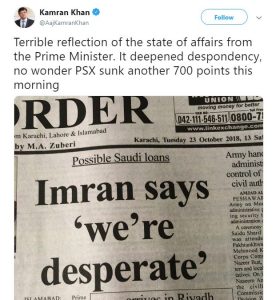
The government responded with a lie. It denied the interview ever took place. Naeemul Haq, assistant to Khan on political affairs, called the journalists “a group of foreigners touring Pakistan”.
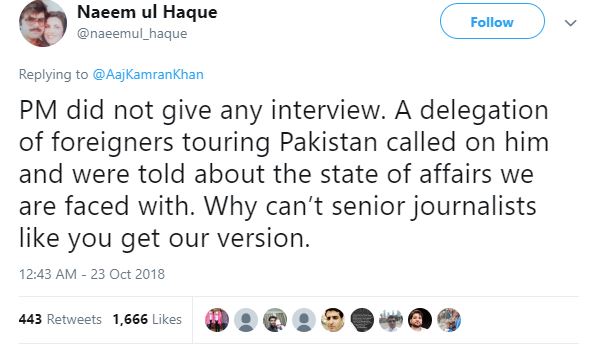
What followed should be mortifying enough for this government to desist from lying in future. Journalist Amanda Coakley provided evidence and contradicted Haq saying that they were “part of a UK media delegation” in a series of tweets.
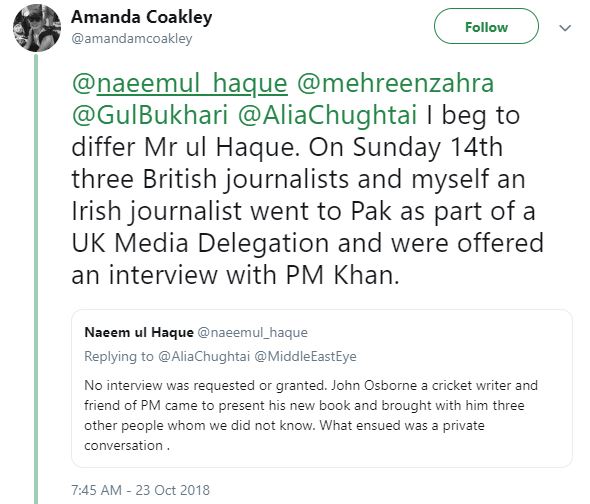
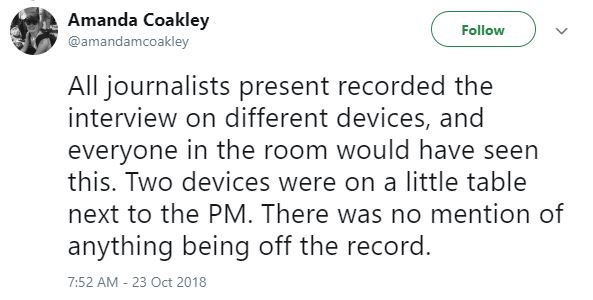
She explicitly disclosed that the Pakistan High Commission in London had arranged and paid for their visit to interview Khan.
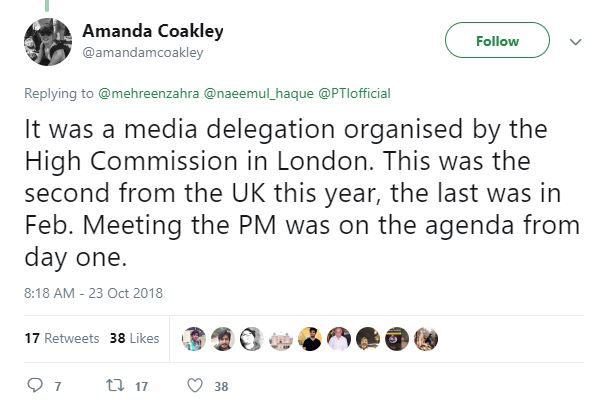
“Surreal” is how Issam Ahmed of the AFP described the entire episode.
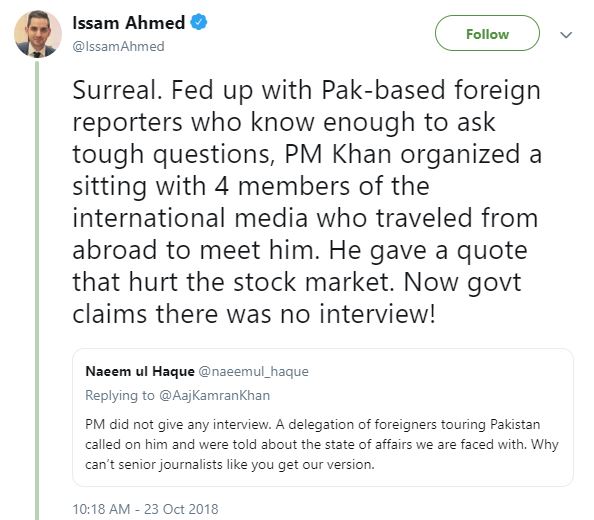
Amid this deeply embarrassing firestorm, Imran Khan proceeded to the investor conference in Saudi Arabia and asked the kingdom for loans for the second time in as many months. The earlier trip had been a failure, with no loans or deferred payments secured, but a whole new opportunity had opened up in the wake of Jamal Khashoggi’s murder and Mohammed bin Salman’s growing isolation. So, now the loan was more forthcoming in return for solidarity at a time when the Saudi authorities are being accused of murder and dismemberment.
Still, Khan could have used this opportunity to sell Pakistan. Instead, he addressed a nearly empty hall of investors of a Pakistan-specific event, and horrified investors with tales of how bad things were.
He launched into a lengthy lecture on the horror story the Pakistani economy is in because of the corruption of past governments (PML-N and the PPP); the dire need of loans and remittances from overseas Pakistanis via banking channels; and on clamping down on money laundering of funds. It could have been a political speech from a container. It was more about wild-goose chases than any real economic measures.
Asked how he planned to ensure transparency to build investor confidence in Pakistan, Imran Khan went into a wild oration about corruption again, on the destruction of state institutions, and opining on why countries become poor. These are the kinds of speeches and slogans that he also uses to appeal to his supporter base. It became vastly clear that he neither knew what he was talking about nor did he have the capacity to differentiate between international investors and his fawning fans at home.
The gold nugget he offered was that he planned to move away from mega infrastructure projects to human development because “mega projects give mega kickbacks, which leave a country indebted”.
It is quite another matter that Pakistan has never before planned or executed any mega project in the last 71 years, like Imran Khan’s own mother-of-all-megaprojects – the $180bn worth 5 million housing scheme, with no feasibility plan.
Khan may have been the only one in the room on whom this monumental irony was lost.
He ‘containered’ on with his harangue of strengthening institutions, corruption, cronyism, and claims of having made laws to help exporters. None of this contained specifics on transparency measure. It was a repeat of his five years of agitation speeches, while his government continues to appoint a slew of cronies like Zulfi Bukhari, Anil Mussarat, and Naeemul Haq to key positions.
Asked about employment generation, he mentioned his crown jewel housing scheme and urged the overseas Pakistanis to return, invest and create jobs. To every subsequent question, his answers remained the same: Corruption, money laundering, overseas Pakistanis, enabling environment. So much so that when one member of the audience asked what measures his government would take to make exit easier for private equity investors, he first alluded to the presence of the chairman board of investment, then minister finance, then minister or commerce and then repeated that he would create an enabling environment for FDI.
Imran Khan made one thing absolutely clear: He was clueless.
Instead of inviting investors to invest in the ailing economy, improve agriculture with water-saving techniques, or manufacture consumer goods, he recalled the alpine-to-coastline geographic features from Pakistan Studies to lure investors to invest in the tourism industry. All the while, denigrating the country again with reminders of terrorism, corruption, bad governance and money laundering.
It’s not clear whether this trip would attract foreign investment, or scare away those few who may have been considering investing in Pakistan in this politically unstable period. But the visit certainly prized a deposit of $3 billion for a year and deferred oil payments for three years from the Saudi crown prince Mohammed bin Salman as a visible result of standing by him amid murder allegations, with bowl in hand. Next level machinations such as conspiracy theories implicating the US itself in the murder by the famous spokesperson on the economy may also have helped.
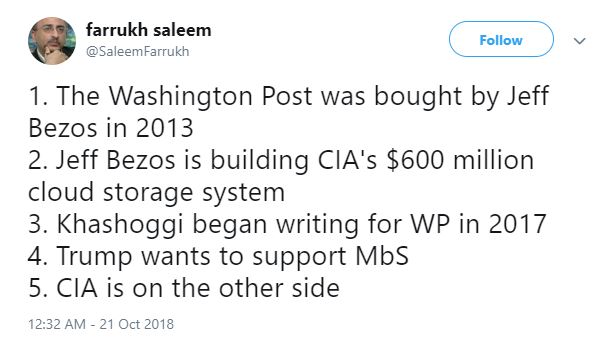
A small breathing space has been created with the Saudi loan for Pakistan. Next, Imran Khan plans to visit China and Malaysia with another bowl in hand. Will they be as amenable, given they haven’t recently been embroiled in high-profile murders, nor, therefore, stand isolated?
No comments:
Post a Comment